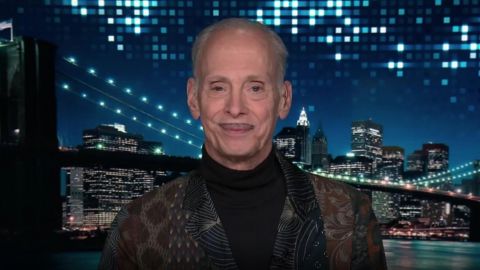Read Transcript EXPAND
CHRISTIANE AMANPOUR: So, here’s your latest book with a big long title, “Mr. Know-It- All: The Tarnished Wisdom of a Filth Elder.” So, first, I have to ask you, what is a filth elder as far as you’re concerned?
JOHN WATERS, Author, “Mr. Know-It-All”: Well, a filth elder, I guess, is somebody that has been around for 70-some years, has learned lessons and feels that he should pass it on to filth followers everywhere in the world. His — what he has learned from getting through Hollywood, getting through the art world, getting through Baltimore, getting through all the different spoken word shows I do and everything, all the different aspects of being able to tell stories and somehow avoid respectability.
AMANPOUR: So, what filth are you passing on? And do you really mean to, you know, pass on filth?
WATERS: Well, the word filth, I just use that word. It’s sort of a punk rock word. It’s — you know, first there was camp, then there was trash and then there was filth, which was kind of punk rock. So, I think even filth’s a little used up. But it’s just shows humor with an edge, I think, which has become American humor, really.
AMANPOUR: It really is. I mean, I wonder if you ever imagined that it would become sort of standard American humor so quickly and whether you feel you’re constantly looking for another edge.
WATERS: Well, I’m always trying to make you laugh, that’s the main thing, and I always just make fun of things that I really like, and that’s why I think I’ve been able to get away with it for 50 years. My dreams all came true. I know that would make people puke to hear that. Oh, my God. But they really did and I never had to get a real job. So, that and I’m never around idiots either. That’s the hardest thing to negotiate, to get to the point in your life when you’re never around idiots.
AMANPOUR: OK. Tell me how you negotiate that then.
WATERS: Well, you solve each way that you work your way into every bit of the — of your world and you have passed the idiots, you have somehow avoided them. And in the beginning, you have to only deal with idiots, usually, but then you learn how to weed them out and to fail upwards, which is something I’ve done my whole life.
AMANPOUR: So, does this book have a little bit of a farewell tone to it? I mean, you know, you are putting all your, as you say, tarnished wisdom, to the benefit of the filth followers and all of us. But so, are you saying — what are you saying?
WATERS: I’m not saying good-bye because I’m busier than I’ve ever been in my entire life, really, these days but I haven’t made a movie in a while but the books do better than the movies. And what I’m saying is I always have to have a way to tell stories and I don’t think that I have used up all my stories, no, because I signed a two-book deal, I’m writing a novel now about a woman that steals suitcases at airports. So, I’m always inspired by new things that are going on in the press and the media and everything. So, it’s not a farewell, even though at the end of the book I do tell you how to beat death and I do tell you how to tell someone you love them without risk of emotional trauma.
About This Episode EXPAND
Christiane Amanpour speaks with Maya Foa and Ibrahim Halawa about Egypt’s mass trials and death sentences; and John Waters about his new memoir “Mr. Know-It-All.” Alicia Menendez speaks with Kate Hamill about “Little Women.”
LEARN MORE


